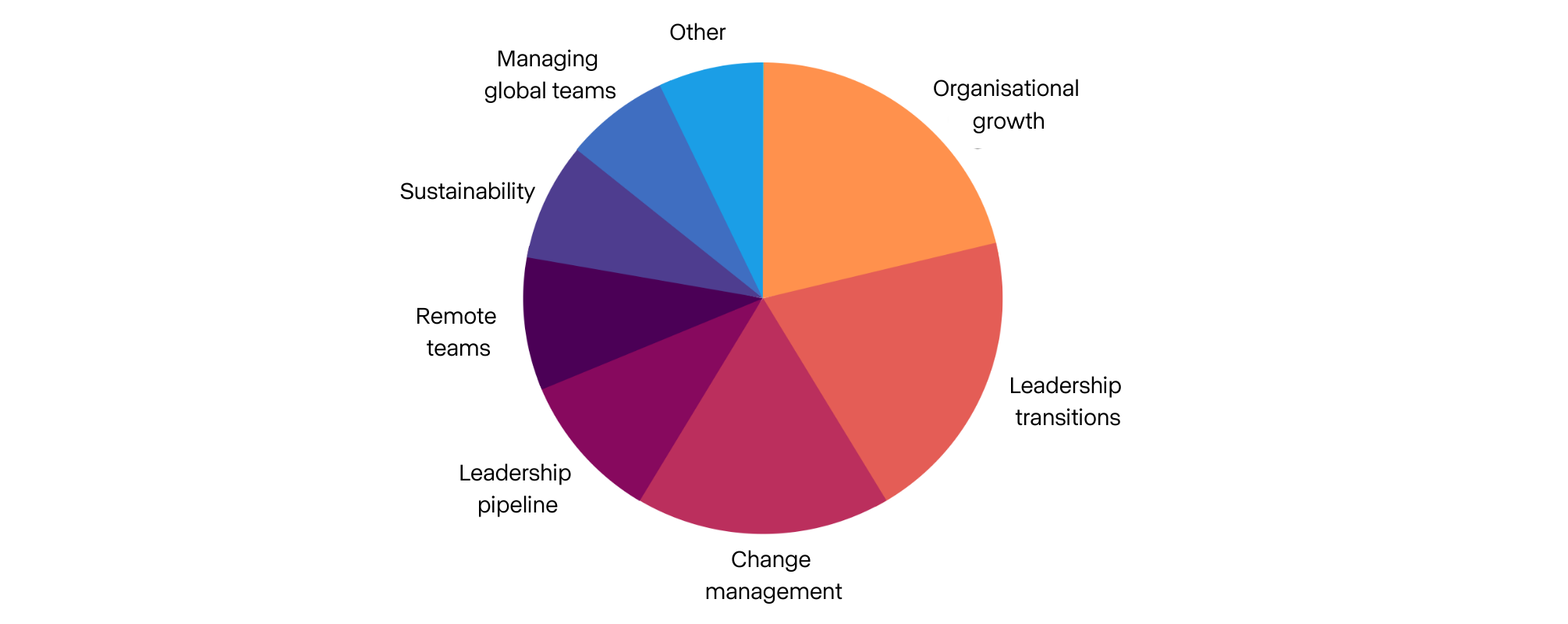By Lorna Kanyuga, Atlas Corps Fellow at Luminate
Luminate launched its coaching stipend programme in 2021 and early 2022 and disbursed over 70 coaching stipends to our partners across the globe. This translates to $530,000 to support 188 leaders in our portfolio.
We designed the application process to be simple, asking interested organisations to answer the question, “How will executive coach(es) benefit you and/or the development of your team?” We also offered 1-1 advising sessions with our Head of People and Culture who provided guidance on coaching to ensure our partners felt equipped to invest in this resource.
Common challenges faced by non-profit leaders
Through this process, we learned about our partners’ leadership challenges and how coaching would support them and their organisations. These are some of the most common leadership challenges mentioned in the applications:

- Managing organisational growth: Some of the most prominent challenges were those related to organisational development such as developing growth strategies and decision-making. One example is an organisation that was struggling to find its relevance in an increasingly crowded sector. Another had recently received a large grant and needed support in using it effectively.
- Managing leadership transitions: Leadership transition processes can be hard, especially when an experienced leader has recently left the organisation or when new leaders begin the role without prior experience. Similarly, some organizations had recently experienced the departure of a leader and needed help with the transition.
- Change management: Some issues raised include changes in strategies and operational models, internal restructuring, and shifts in programmatic focus areas.
- Building leadership pipeline: Several applicants expressed the need to build up leadership within their team members with the expectation that they would take up leadership roles in the future.
- Managing remote teams: Managing teams is one of the most challenging aspects of leading an organisation, but the recent shift to more remote working has added another level of complexity to hiring, onboarding, and managing teams.
- Managing global teams: Closely related to managing remote teams, working with culturally diverse staff members based around the world is becoming a more common challenge.
- Sustainability: Some organisations were concerned about their ability to raise money, and some had recently lost funding, while others were considering exploring revenue-generating activities that could reduce their donor dependence.
Priority areas for leadership coaching
Applicants identified priority areas where they hoped that the leadership coaching would support them:
- Team leadership and team development: Leaders felt that the coaching would enable them to create strong collaborative teams and support their team members’ growth. Some of the key areas they wanted to work on included managing remote teams, allocating team responsibilities, managing global/cross-cultural teams, building a team culture, managing skill development, and fostering collaboration.
- Strategic planning: Developing and implementing strategies that would ensure growth and making the right decisions for their teams and organisations.
- Managing operations: Some applicants noted that coaching would help them in managing the complexity of running an organisation with good decision-making, critical thinking and strategic planning.
- Developing their leadership style: Many first-time leaders felt that coaching would allow them to identify and develop their personal leadership style. This also included personal reflection to understand their strengths and weaknesses and coaching to develop their leadership vision.
- Working with other leaders/co-directors: Some leaders in co-director roles hoped that the coaching would help them to improve their communication and conflict management skills to work more effectively with co-leaders.
Other areas mentioned in the applications included developing confidence, managing impostor syndrome, maintaining work/life balance, fostering diversity and inclusion, and working effectively.
What's next
We will share learnings from our partners’ coaching reports in an upcoming blog. We’ve already received some feedback from our partners, with one example below:
“With this support from Luminate, we were able to invest in the personal and professional growth of our team in an entirely new way this past year. A well-supported team is crucial for the impact we strive to create, for the organizational culture of wellness and equity we work to foster, and for our resilience as we navigate some unexpected challenges. We are so grateful for Luminate's leadership in this area and look forward to our continued partnership.”
Stay tuned for an upcoming post with more feedback and learnings.